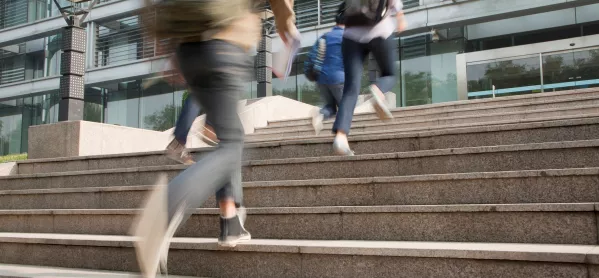- Home
- ‘The cult-like expectation to go into HE is still rife’
‘The cult-like expectation to go into HE is still rife’

I often find myself being the odd one out, not fitting into formulas or following flight-path models. I am good with technology, but bad at maths. I can comfortably give presentations and talk to groups of people, but I am introverted. I love learning, but I am crap at exams. Right now, I am drowning in UCAS and personal statements and significant decisions.
Should I go to university or not? It feels like there’s pressure to have to go to university and get a degree in the traditional sense. And it is a bad thing. Here’s why.
My programme manager covered a lesson a few days ago, and we got onto the topic of next steps. The take-away message? Go to university and become a graduate or cap your earning potential and never get into that C-suite exec role.
They detailed that the nice car, the holidays, the big houses could never be ours if we did not go to university next year. It felt like more than a sales pitch – it was a plea. Please go to university and in three-years’ time enter a graduate entry scheme. Even if you do not want to go, college enforces a UCAS application to a university "just in case you change your mind".
News: End 'pointless, nonsensical gulf' between FE and HE, says prime minister
More: Why Boris Johnson's skills speech was a key step
Jo Johnson: The snobbery about FE has 'gone'
'We cannot all follow the same path'
The trouble is, my friend Charlie does not want to go to university. He is desperate to enter the media industry as a freelancer, working with brands and getting work experience. He does not want to commit to the £40k+ student loans and three years hidden from the real world.
Charlie produces top-quality work, with distinctions across the board. He knows that he would have no problem in the workplace, and neither does his tutor – after all, it was him who provided Charlie with his first freelance gig, filming a video for his band. Yet, because of targets and data modelling, his tutor feels forced to uncomfortably push the university ideology to him.
Jasmine, on the other hand, is looking forward to going to university, because she wants to specialise in fashion journalism, and is excited to be applying to the London College of Fashion to network with professionals and build on his editorial techniques.
For Jasmine, university is going to be a great opportunity. She is also looking forward to joining clubs and societies, and the student life – something that Charlie just does not really value. That should not be a problem – after all, we cannot all follow the same path.
Charlie can get angry about being forced to apply to university. He can feel frustrated that his college just does not seem to be supporting him with his goals and ambitions and feels a peer pressure to follow the herd and go to university. He has started to disengage from his tutor and skipping tutorials, simply so he does not have to listen to what he describes as a UCAS indoctrination. As his peer, this makes me feel sad: with everything else, college is a diverse, open environment – so why is there this cult-type expectation to go to university?
Give equal weight to every path
To quote Stealers Wheel, I feel stuck in the middle (with you). One day, I am so up for the idea of moving away to university and studying for a degree. The very next, I will be freelancing with a client, and loving the real-life experience, and feel certain this is the way for me.
Then imposter syndrome kicks in: do I really have all the skills I need to go straight into work? And I remember I will only be 18 – I am reliably informed that is quite young, and that 30 is in fact not old. But then I remember it would mean three years in the classroom again, not earning money. And so on and so on until it gets to 2am and I finally fall asleep.
I know, and I hope, that not every college teacher is the same, and that most teachers are supportive of their students and their ambitions. In fact, the majority are. But it’s vital, especially in the current times, that we give equal weight and airtime to every possible path: the Kickstart scheme, apprenticeships, jobs with training, entry-level jobs, higher education, and all the other opportunities that I haven’t listed.
Alfie Payne is a media student from Hampshire
Keep reading for just £1 per month
You've reached your limit of free articles this month. Subscribe for £1 per month for three months and get:
- Unlimited access to all Tes magazine content
- Exclusive subscriber-only stories
- Award-winning email newsletters



